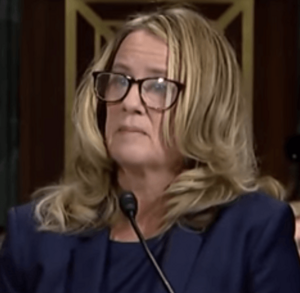Christine Blasey Ford facts for kids
Quick facts for kids
Christine Blasey Ford
|
|
|---|---|

Ford in 2018
|
|
| Born |
Christine Margaret Blasey
November 1966 (age 59) |
| Education | |
| Occupation | College professor |
| Spouse(s) |
Russell Ford
(m. 2002) |
| Children | 2 |
| Relatives | Bridgit Mendler (niece) |
| Scientific career | |
| Fields | Psychology |
| Institutions |
|
| Thesis | Measuring young children's coping responses to interpersonal conflict (1995) |
| Doctoral advisor | Michael D. Newcomb |
Christine Margaret Blasey Ford is an American professor of psychology. She teaches at Palo Alto University and works as a research psychologist at the Stanford University School of Medicine. She is an expert in creating statistical models, which are tools used to understand information from research studies.
In September 2018, Ford became well-known in the United States. She made a serious accusation against Brett Kavanaugh, who was then being considered for the U.S. Supreme Court. She said that he had acted improperly toward her when they were teenagers in 1982. Ford shared her story at a hearing with the Senate Judiciary Committee during Kavanaugh's nomination process.
Contents
Early Life and Education
Ford was born Christine Margaret Blasey and grew up near Washington, D.C. Her parents were Paula K. and Ralph G. Blasey Jr. She has two brothers.
From 1978 to 1984, she went to the Holton-Arms School, a private school for girls in Bethesda, Maryland. She was a talented diver on her school's team. She even went on a trip to the White House with famous diver Greg Louganis.
Ford loved to learn. She earned several degrees from different universities:
- A bachelor's degree in experimental psychology from the University of North Carolina at Chapel Hill in 1988.
- A master's degree in clinical psychology from Pepperdine University in 1991.
- A PhD, which is a high-level degree for experts, in educational psychology from the University of Southern California in 1996.
- Another master's degree in epidemiology, focusing on biostatistics, from Stanford University School of Medicine in 2009.
Career in Psychology and Research
Ford has had a long career as a research psychologist and a biostatistician. A biostatistician uses math and statistics to study topics in biology and health.
She has worked at Stanford University's School of Medicine since 1998. Since 2011, she has also been a professor at Palo Alto University. She teaches advanced students about research methods, statistics, and how to run clinical trials.
Ford has also worked with drug companies and the FDA. The FDA is the part of the U.S. government that makes sure food and medicine are safe. She has co-written many articles and books on psychology topics, such as depression and how children cope with problems. One of her books helps researchers figure out how to design their studies correctly.
Public Recognition
After she spoke out in 2018, many people and groups recognized Ford for her courage.
- A women's club and workspace called The Wing named a conference room after her in San Francisco.
- Time magazine listed her as a finalist for its Person of the Year award in 2018.
- In 2019, Time named her one of the 100 most influential people in the world. Then-Senator Kamala Harris wrote the tribute for her.
- She was also nominated for an award from the University of North Carolina at Chapel Hill for "speaking truth to power."
In December 2018, Ford presented an award to Rachael Denhollander, a former gymnast who also spoke out about important issues.
Personal Life
Before 2018, Ford lived a private life in Palo Alto, California. She married her husband, Russell Ford, in 2002, and they have two sons. After she became a public figure, she said her family had to move several times for their safety.
Ford is a registered Democrat. In 2017, she took part in a Women's March and a March for Science. These were events where people gathered to show support for women's rights and scientific research.
Selected Works
Ford has co-written many articles for scientific journals. One article from 2021 discussed her testimony and how it related to ideas from ancient Greek plays.
- Malli, Marina (2021). "'My heart, how shall I keep silent?' The Personal as Political: Foucault's Parrhēsia in Euripides' Ion and the Testimony of Christine Blasey Ford". Symploke 29 (1): 431–456. doi:10.1353/sym.2021.0022. Project MUSE 837813 ProQuest 2599944250.
 | James Van Der Zee |
 | Alma Thomas |
 | Ellis Wilson |
 | Margaret Taylor-Burroughs |

